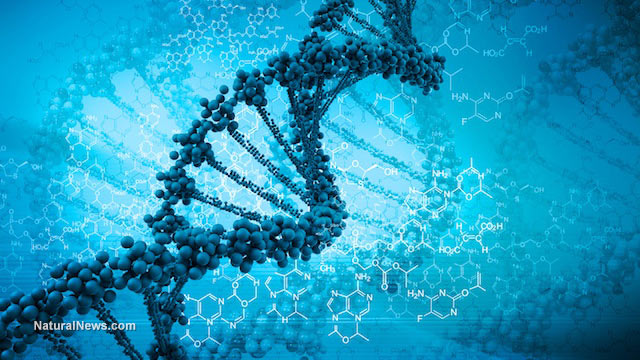Ancestry.com colludes with police to share your genetic information in violation of privacy rights
Thursday, May 14, 2015 by: J. D. Heyes
Tags: DNA, police, Ancestry.com

- Newly released JFK files reveal Pentagon's role in creating Lyme disease and covid in the same lab
- Trump nominates VACCINE ZEALOT Susan Monarez to lead the CDC, sidelining RFK Jr.'s reform efforts
- BEWARE: USDA allows genetically engineered vaccines to infiltrate organic food production
- Obama accused of laundering USAID funds to fuel global protest movements, regime change operations
- Festive flavors: The sweet history, nutritional profile and health benefits of pecan pie
- Dr. Mike Yeadon releases 15-minute testimony - WATCH - about genocidal intent of COVID “vaccines”
- Analysis: The coming economic collapse, a mass uprising and Trump's three secret weapons to halt the growing revolt
- Big Pharma's media takeover: How drug companies bought the news - and your health
- Elon Musk: Aliens could be here on Earth RIGHT NOW
- Trump reverses course on Gaza plan, says “nobody is expelling Palestinians”
- Survival 101: Effective EMF blocking techniques
- Reclaim your health: How midlife exercise reverses years of inactivity
- Big Pharma's $8 Billion bribery scheme exposed: how doctors are pushed to prescribe junk science, not heal
- Rep. Nancy Mace introduces bill to ban biological males from female facilities on federal property
- California's social media censorship law struck down: A victory for free speech or a threat to online safety?
- HUGE: Putin claims 2020 election fraud in U.S. sparked Ukraine war, calls for peace talks with Trump
- RFK Jr.'s SSRI antidepressant investigation sparks liberal meltdown, exposes Big Pharma's dangerous game
- Chris Rufo finally reveals abuse liberals unleashed on his wife and young kids...
- Elon Musk: Aliens could be here on Earth RIGHT NOW
- EPA advisor admits the agency is funneling billions to climate groups ahead of Trump’s return to White House
- Trump reverses course on Gaza plan, says “nobody is expelling Palestinians”
- Reclaim your health: How midlife exercise reverses years of inactivity
- A lack of integrity in Academia: Harvard professor found GUILTY of fraudulent research to promote CRT theory
- Space war brewing? Russia threatens to destroy Starlink satellites
- Big Pharma's $8 Billion bribery scheme exposed: how doctors are pushed to prescribe junk science, not heal
- Mike Adams Sermon 66: God will DESTROY ISRAEL for its wickedness
- Rep. Nancy Mace introduces bill to ban biological males from female facilities on federal property
- Survival 101: Effective EMF blocking techniques
- 5 Simple steps to boost your brainpower: How to strengthen executive function in a distracted world
- Historian warns Israel may be entering an “IRREMEDIABLE DECLINE”
- Florida takes a stand: DeSantis proposes permanent ban on mRNA vaccine mandates
- RFK Jr.'s SSRI antidepressant investigation sparks liberal meltdown, exposes Big Pharma's dangerous game
- New York politicians push bill allowing governor to indefinitely detain the unvaccinated on a whim
- Sales of survival bunkers rise following Russia’s use of the Oreshnik hypersonic ballistic missile
- Pilots report mysterious lights 'moving at extreme speeds' across Oregon skies
- Newly released JFK files reveal Pentagon's role in creating Lyme disease and covid in the same lab
- EPA advisor admits the agency is funneling billions to climate groups ahead of Trump’s return to White House
- The Health Ranger releases “Vaccine Zombie” song and music video, using AI-animated zombies for the music video
- The pandemic as a tool for INDOCTRINATION: Understanding “The Indoctrinated Brain” by Dr. Michael Nehls
- California's social media censorship law struck down: A victory for free speech or a threat to online safety?
- Dr. Mike Yeadon releases 15-minute testimony - WATCH - about genocidal intent of COVID “vaccines”
- Congratulations to the FULLY UNVACCINATED as you resisted the COVID-19 PROPAGANDA MACHINE fueled by over $100 BILLION
- Mike Adams releases country western hit single: Goin’ Back in Time is Comin’ Home
- RFK Jr. clears key hurdle: Sen. Susan Collins backs controversial HHS nominee, signaling a new era for health policy
- Mike Adams releases music poetry sensation: A Child of God
- Mike Adams releases new song and music video: Nothing More Disgusting Than a Globalist
- Unpacking the Lies That We’ve Been Fed – new song and music video released by Mike Adams, the Health Ranger
- Trump administration takes on global censorship: A new frontier for free speech advocacy
- Florida takes a stand: DeSantis proposes permanent ban on mRNA vaccine mandates
- “Why we influenced the 2020 elections”: Facebook files reveal the coordinated effort to bury the Hunter Biden laptop story
- Ex-FBI Chief EXPOSES disgraceful government coverups of Oklahoma City Bombing, Kennedy assassinations, 9/11 WTC, and "Terrorism" as plot to destroy Constitution
- Michigan sheriff announces criminal investigation into 2020 election crimes, Dominion Voting Systems
- Israeli soldiers accused of even more torture and abuse in the West Bank
- Federal judge backs Trump's mass firings, clearing path for government downsizing
- Red Cross issues warning to stop blood plasma donations from vaccinated people
- Scientists confirm: GENIUS brain function can be spontaneously unleashed in humans without any apparent cause
- EPA advisor admits the agency is funneling billions to climate groups ahead of Trump’s return to White House
- HYSSOP: What research reveals about the health benefits of this ancient holy herb
- Two containers with completed ballots fall out of truck in Florida
- Fully vaccinated about to see “tsunami” of illness and death, warns virologist
- Today I asked our AI language model “Neo” about which phytonutrients or phytochemicals can block the spike protein related to SARS-CoV-2 … Here is what it answered…
- Global leaders unite to clamp down on “misinformation” with UN-backed Cascais Declaration
- BREAKING: 2025 NDAA authorizes mandatory military draft of WOMEN across America… as Pentagon pursues global NUCLEAR war with both Russia and China at the same time
- Michael Yon warns of a ZIONIST TAKEOVER in Trump’s second administration
- BOMBSHELL: DNA testing kits are a SCAM to develop ethnic-specific bioweapons
- Ozempic and Wegovy weight loss drugs are injectable LIZARD VENOM PEPTIDES that may unleash a devastating wave of organ failure… side effects align with symptoms of SNAKE BITES
- Israeli soldiers accused of even more torture and abuse in the West Bank
- These 13 countries just signed an agreement to engineer a global FAMINE by destroying food supply
- NASA admits that climate change occurs because of changes in Earth’s solar orbit, and NOT because of SUVs and fossil fuels
- RFK Jr. clears key hurdle: Sen. Susan Collins backs controversial HHS nominee, signaling a new era for health policy
- Sermon 30: How Jesus reveals Caesar’s FAKE CURRENCY and FALSE AUTHORITY
- Coriander seeds: Ancient medicine backed by modern science
In recent weeks, the New Orleans Advocate published an alarming story that helps explain the very real privacy and civil liberties threats posed by law enforcement access to what were supposed to be private genetic databases and familial DNA searching.
A young woman named Angie Dodge was murdered in her apartment in a small Idaho town in 1996. Although the police collected DNA samples from semen left at the crime scene, they had never managed to match it to existing profiles in any criminal database and the crime went unsolved.
Jump ahead to 2014: Idaho police sent the semen sample to a private laboratory to extract a DNA profile including YSTR and mtDNA, which are the two genetic markers used to determine patrilineal and matrilineal relationships. As noted by the Electronic Frontier Foundation (EFF), an electronic privacy rights group tracking the story, it is not clear why the case was suddenly reopened after about two decades.
"These markers would allow investigators to search some existing databases to try to find a match between the sample and genetic relatives," EFF said.
Police chose a lab linked to a private collection of genetic genealogical data called the Sorenson Database, which is owned by Ancestry.com. It claims it is "the foremost collection of genetic genealogy data in the world." That may be true; Sorenson Database has obtained more than 100,000 DNA samples and documented multi-generational family histories from "volunteers in more than 100 countries around the world."
"Sorenson promised volunteers their genetic data would only be used for 'genealogical services, including the determination of family migration patterns and geographic origins' and would not be shared outside Sorenson," said EFF.
So much for the promise of privacy
Despite the promise, Sorenson's massive collection of data -- including data in other public DNA databases -- can be searched by anyone and is available online, with "DNA results obtained from a commercial lab." Therefore, even without a search warrant or court order, police investigators were able to run crime scene DNA against Sorenson's private data.When they did, 41 potential familial matches turned up, one of which matched 34 out of 35 alleles; this indicates a very close match that generally means there is a close familial relationship.
At that point, police asked Ancestry.com not only for the "protected" name that was associated with the profile but also for "all information including full names, date of births [sic], date and other information pertaining to the original donor." Ancestry.com initially said it would offer up the information in response to a simple subpoena, but police instead obtained a search warrant.
What happened next is just bizarre and potentially dangerous to the liberty of virtually anyone, as EFF noted:
Ancestry.com linked the crime scene DNA to DNA from a man born in 1952. That man didn't fit the age profile of the murderer, so the investigators used the genealogical information to trace his male descendant line and find his son, Michael Usry Jr., born in 1979. Then the cops searched Usry's Facebook page and found he had some Facebook friends who lived somewhat near Idaho Falls. And then through Google searches, the police learned Usry was a filmmaker who had been involved in making a few short films that had homicide or killings in the story line. (The cop noted in a warrant affidavit "these short films have won awards in several film festivals.") Based on this completely circumstantial evidence, the Idaho investigators got a warrant to collect a swab of Usry's DNA.
He was "lucky"
Police contacted Usry to say they were investigating a hit-and-run and asked to meet with him; he agreed. They took him to a room and interrogated him without a lawyer present, eventually collecting a DNA sample. Usry waited nervously for the results for a month.In the end, police found that the samples did not match. Although there was a close familial relationship, Usry was not the killer.
He was lucky, especially given the shaky scientific ground involving other, far less reliable DNA analyses.
Sources:
http://www.activistpost.com
http://thefreethoughtproject.com
www.eff.org
http://www.theneworleansadvocate.com
DNA at FETCH.news
Get independent news alerts on natural cures, food lab tests, cannabis medicine, science, robotics, drones, privacy and more.
Take Action: Support Natural News by linking to this article from your website
Permalink to this article:
Embed article link: (copy HTML code below):
Reprinting this article:
Non-commercial use OK, cite NaturalNews.com with clickable link.
Follow Natural News on Facebook, Twitter, Google Plus, and Pinterest
Science News & Studies
Medicine News and Information
Food News & Studies
Health News & Studies
Herbs News & Information
Pollution News & Studies
Cancer News & Studies
Climate News & Studies
Survival News & Information
Gear News & Information
News covering technology, stocks, hackers, and more



"Big Tech and mainstream media are constantly trying to silence the independent voices that dare to bring you the truth about toxic food ingredients, dangerous medications and the failed, fraudulent science of the profit-driven medical establishment.
Email is one of the best ways to make sure you stay informed, without the censorship of the tech giants (Google, Apple, Facebook, Twitter, YouTube, etc.). Stay informed and you'll even likely learn information that may help save your own life."
–The Health Ranger, Mike Adams













































